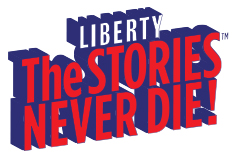11 Minute Video Introduction to Liberty Magazine
Liberty: A Weekly Periodical for Everyone was founded in 1924 by Joseph Patterson, publisher of The New York Daily News, and Robert McCormick, publisher of The Chicago Tribune and often regarded as the world’s greatest publisher.
From its start, Patterson and McCormick set out to make Liberty more topical, daring and exciting than any competitors. Information was presented in a style heavily influenced by the emerging movie industry and focused on the most sensational and popular issues.
The magazine flourished when illustrated magazines were the most important form of mass entertainment. This was also an era of unique creativity and growing involvement in world affairs. During the following 26 years, the magazine shared the moods, attitudes, lifestyles, fads, and fortunes of America through its three most significant decades.
Liberty Magazine’s ongoing circulation of more than 3 million a week was founded on the high quality and originality of its art, stories and other features. Its prominence and willingness to pay top dollar for the best attracted original contributors from the greatest artists, writers, celebrities and statesmen of the age.
Writers
F. Scott Fitzgerald
Paul Gallico
Irvin S. Cobb
John Galsworthy
P.G. Wodehouse
George Bernard Shaw
Agatha Christie
Dr. Seuss
F. Hugh Herbert
Robert Benchley
Louis Bromfield
Dashiell Hammett
H. L. Mencken
Budd Schulberg
Howard Fast
Sidney Sutherland
Celebrities and Statesmen
Franklin D. Roosevelt
Mahatma Gandhi
Mae West
Bob Hope
H. G. Wells
Frank Sinatra
Katherine Hepburn
Jean Harlow
Babe Ruth
Harry Houdini
Fiorello LaGuardia
Greta Garbo
Leon Trotsky
Benito Mussolini
Al Capone
Amelia Earhart
Artists
James Montgomery Flagg
McClelland Barclay
Neysa McMein
Peter Arno
Arthur William Brown
WT Benda
Cesare
Harold Anderson
John T. McCutcheon
Willy Pogany
John Held Jr.
Walt Disney
Leslie Thrasher
Robert Edgren
Ralph Barton
Herb Roth
Robin Kirby
Addison Burbank
Wallace Morgan
Harold Von Schmidt
Motion Picture and Television
Over the years, as many as 120 of the literary properties were adapted for motion pictures. These include such major films as: Double Indemnity, Diary of Sergeant York, My Man Godfrey and the television series Mr. Ed, The Talking Horse. The long running story written and illustrated by Leslie Thrasher, For the Love o ‘Lil, was featured weekly on the magazine’s cover for 6 years. The story was subsequently made into a radio series and a Columbia Pictures movie; it’s recognized as America’s first soap opera.

